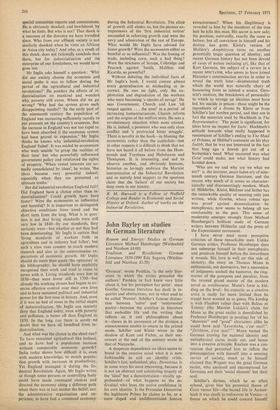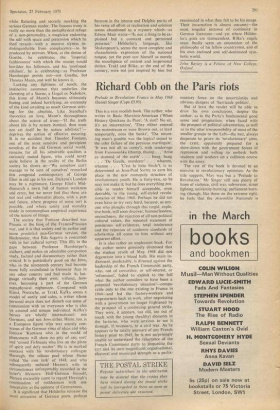John Bayley on studies in German literature
'German', wrote Pushkin, 'is the only liter- ature in which the critics preceded the authors.' Pushkin in fact knew very little about it, but his perception has point : since Goethe, German literature has dealt in in- quiries and abstractions, not in what used to be called 'Nature'. Schiller's famous distinc- tion between 'naïve' and 'sentimental' poetry—between the creation in literature that embodies life and the writing that reflects on it and philosophises about it—shows in its awareness of the division a consciousness unable to create in the primal mode. Schiller and Kleist wrote in the shadow of Kant and Fichte, as their suc- cessors at the end of the century wrote in that of Nietzsche.
A desperate dependence on ideas seems to breed in the creative mind what it is now fashionable to call an identity crisis. Schiller's last, unfinished, play, Demetrius, is in some ways his most interesting, because it is not an abstract and calculating tragedy of the 'ideal' but a demonstration—vividly ap- prehended—of what happens to the in- dividual who loses the native confidence in his own identity. Is the Pretender Demetrius the legitimate Prince he claims to be, or a mere duped and undifferentiated human
consciousness? When his illegitimacy is revealed to him by the murderer of the true heir he kills this man. His secret is now safe; his position, outwardly, exactly the same as
before; but all conviction in himself and his destiny has gone. Kleist's version of Moliere's Amphitryon turns on another potentially tragic question of identity; and
recent German history has not been devoid of cases of nature imitating art, like that of Kurt Gerstein, the subject of a review in a
recent SPECTATOR, who seems to have joined
Himmler's extermination service in order to reveal the truth later—disinterested truth which the world was naturally chary of honouring from so tainted a source. Gers- tein's motives, the breakdown of personality to which so strange an idealism must have led, his suicide in prison—these might be the ingredients of a drama by Kleist or from Schiller's last sombre period, and they are in
fact the materials used by Hochhuth in The Representative. The point is significant, for ideas have no respect for facts: Hochhuth's attitude towards what really happened is reminiscent of Schiller's ending to The Maid of Orleans, or Hebbel's comment on his play Judith, that he was not interested in the fact that long ago a Jewish girl cut off a barbarian's head. What mattered was what Geist could make, not what history had handed down.
'Who are we and why are we what we are?' is the insistent, angst-laden cry of nine- teenth century German literature, and the reason why much of it seems so character- istically and disconcertingly modern. Much of HOlderlin, Kleist, 130chner and Stifter has the remarkable quality of seeming only just written, while Goethe, whose robust ego was proof against demoralisation by metaphysics; now seems to belong all too comfortably to the past. This sense of modernity emerges strongly from Michael Hamburger's brilliant study of German writers between Holderlin and the poets of the Expressionist movement.
I have never read more perceptive criticism of these remarkable men. Unlike German critics, Professor Hamburger does not submerge himself in their metaphysics and prostrate himself before the inwardness it reveals. His love is well on this side of idolatry; the essay on Thomas Mann is enthusiastic, not destructive, but a succession of judgments unshell the humorist, the ring- master of the pompous and peculiar, from the revered grand master of the modern novel as weltliteratur. Mann's forte is kid- ding on the level: his capacity as a creative artist is really far more limited than he would have wanted us to guess. His kinship is with Flaubert rather than with Balzac or Tolstoy (the Marxist Lukics's claim for Mann as the great realist is demolished by Professor Hamburger in passing) for 'of his "demonic" and "good" characters alike he could have said "Leverkuhn, e'en moil", "Zeithlom, c'est moil"' Mann turned the German craving for national identity and metaphysical status inside out, and hence into a creative principle. Realism was a con- vention that permitted him to inflate the preoccupation with himself into a seeming survey of society, much as he himself claimed that Wagner was the great German realist, who analysed and encompassed for Germans not their 'social element' but their soul.
Schiller's dictum, which he so often echoed, gives him his perennial theme of Geist versus life—the buried life in Aschen- bach it was death to rediscover in Venice—a theme on which he could conceal himself while flattering and secretly mocking the -serious German reader. The famous irony is really no more than the metaphysical refuge of a non-personality, a magician endowing the self with space and pretension which he then reveals—with a massive slyness in- distinguishable from complacency—to be produced by mirrors. When, at the shrine of Goethe, he celebrates the 'imperial faithlessness' with which the master would bewilder his followers, and his 'profound nihilism', he is celebrating—as Professor Hamburger points out—not Goethe, but Thomas Mann, and well he knows it.
Lacking any lightness of touch, the instinctive assurance that underlies the clowning of a Sterne, a Gogol or Nabokov, this irony of Mann's becomes ultimately boring and indeed horrifying, an extremity of the kind awaiting so much German striv- ing for the absolute. Like Stendhal's theoretics on love, Mann's thoroughness about the nature of irony—lf the truth about life is by nature ironical, then must not art itself be by nature nihilistic?'— deprives the notion of effective meaning. It is no accident that Theodor Fontane, one of the most sensitive and percipient novelists of the old German social world, remains for all his admirable qualities a curiously muted figure, who could never quite believe in the reality of the Berlin society he shows us—We somehow can't manage to be sure of ourselves' remarked this congenial contemporary of George Eliot in old age to his son. Dickens's London may be a nightmare, George Eliot's Mid- dlemarch a town full of human weakness and error, but we never feel that these are not real and substantial places, with a past and future, where progress of some sort is possible, and where sanity and morality reside in commonplace empirical experience of the nature of things.
The society that Fontane described was Prussia at the time, of the Franco-Prussian war, and it is that society and its earlier and more gemiitlich pan-German version, the Biedermeier, that Eda Sagarra is concerned with in her cultural survey. This fills in the gaps between Professor Hamburger's authors, and makes an admirable companion study, factual and documentary rather than critical. It is particularly good on the Jews, who in the nineteenth century had become more fully assimilated in Germany than in any other country and had made its lan- guage virtually their own; without, how- ever, becoming a part of the German metaphysical nightmare. Cornpared with Kleist, Nietzsche, or Trakl, Kafka seems a model of sanity and calm, a writer whose Personal angst does not disturb our sense of communion with an everyman who is also an assured and unique individual. Kafka's heroes are wholly international : not Germans, and not Jews either. Heine, too, is a European figure who was acutely con- scious of the German virus of ideas and who foresaw `Kantians who in the world of Phenomena will show no pity of any sort' and 'armed Fichteans who live on the plane of spirit and defy matter'. He is in marked contrast with his revolutionary colleague Herwegh, the odious poet whom Heine called 'the iron lark' of 1848, and who subsequently seduced Herzen's wife in circumstances unforgettably recorded in the latter's Memoirs. Half-German himself, Herzen excusably came to regard Herwegh's Combination of ruthlessness with sen- timentality as the epitome of Germanness.
It is significant that Holderlin remains the most attractive of German poets, perhaps
because in the intense and Delphic purity of his verse all effort at realisation and solution seems abandoned to a. mystery which—as Edwin Muir wrote-1s not a thing to be ex- plained but a constant and permitted presence.' Hifilderlin's language, like Shakespeare's, seems the most complete and characteristic expression of the national tongue, yet the poet saw himself as merely the mouthpiece of ancient and impersonal deities. Trakl and Rilke, at the end of the century, were not just inspired by him but
reanimated in what they felt to be his image. Their incarnation is almost uncanny—the most singular instance of continuity in German literature—and yet where Holder- lin's gods are transcendent, Rilke's angels must finally seem an emanation of the philosophy of his fellow countrymen, and of his own enclosed and self-dominated sym- bolic world.
John Bayley is a Fellow of New College, Oxford



































 Previous page
Previous page